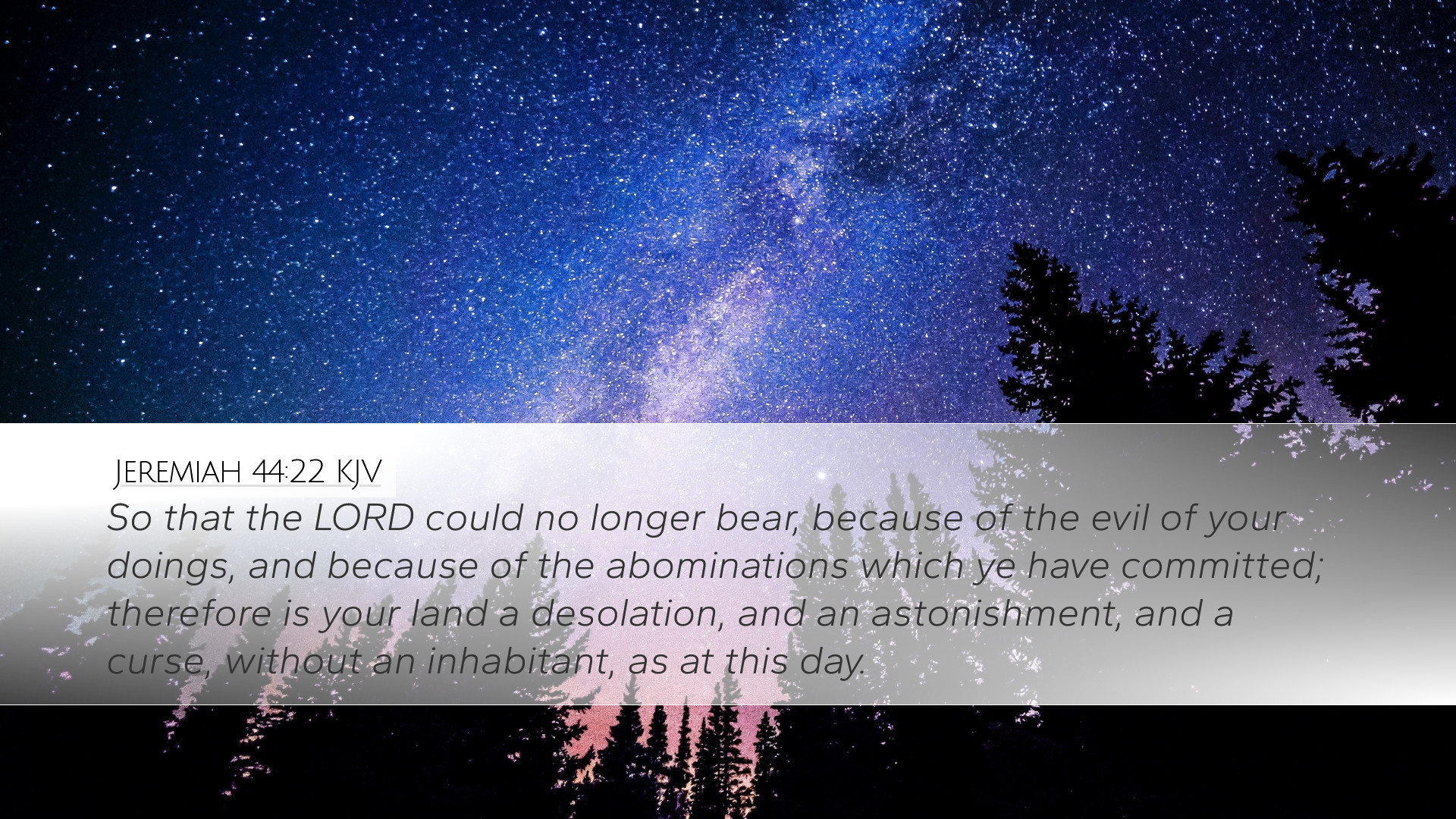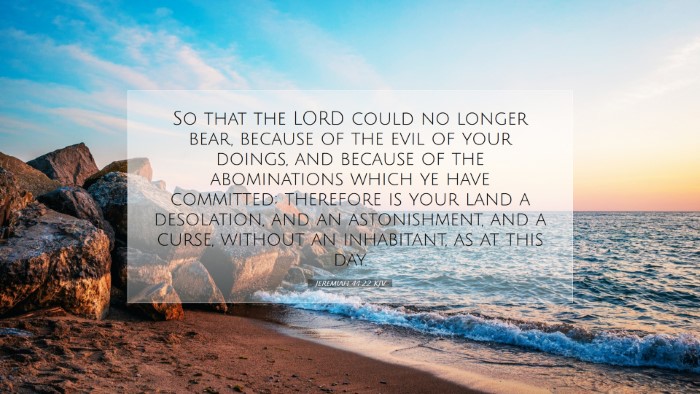Commentary on Jeremiah 44:22
The verse Jeremiah 44:22 serves as a pivotal moment in the prophetic ministry of Jeremiah, encapsulating the tension between divine judgment and human disobedience. This commentary synthesizes insights from several public domain commentaries, namely those by Matthew Henry, Albert Barnes, and Adam Clarke, to provide a comprehensive and meaningful analysis suitable for pastors, students, theologians, and biblical scholars.
Contextual Overview
Jeremiah 44 depicts a scene of deep spiritual crisis among the Jewish exiles in Egypt. The Lord, through Jeremiah, addresses the persistent idolatry of the people who, despite experiencing the dire consequences of their actions, continue to worship false gods. In this context, Jeremiah 44:22 reads:
"So that the Lord could no longer bear because of the evil of your doings, and because of the abominations which ye have committed; therefore is your land a desolation, and an astonishment, and a curse, without an inhabitant, as at this day."
Divine Grief and Judgment
Matthew Henry elaborates on the notion that God’s inability to bear the sins of His people is indicative of His holy nature. The phrase "the Lord could no longer bear" signifies a climactic point of divine patience. Henry notes that God, being infinitely holy, cannot overlook the persistent rebellion of His people. The intensity of divine judgment is a reflection of the profound sorrow that sin brings to God, who desires repentance and reconciliation with His people.
The Consequence of Idolatry
Albert Barnes emphasizes the consequences of idolatry as he parses through the phrase “your land a desolation.” The desolation of the land is more than physical barrenness; it represents a spiritual desolation resulting from the people's turning away from God. Barnes states that when people refuse to heed God's warnings and persist in their sinful ways, they invite calamity upon themselves—both individually and collectively.
The Role of Prophetic Warning
Echoing Henry’s sentiments, Adam Clarke underlines the role of the prophet in conveying God’s warnings. Jeremiah, as God’s messenger, bears the burden of a message that is not only dire but deeply painful. Clarke highlights how the call to repentance is often met with resistance, illustrating the struggle between divine truth and human obstinacy. The refusal of the people to adhere to Jeremiah's prophetic warnings exemplifies the broader human tendency to reject divine counsel.
The Urgency of Repentance
The urgency for repentance is underscored throughout this verse and the chapter as a whole. The call for the people to recognize the gravity of their situation is evident. Both prophetic voices remind the readers of the seriousness with which God treats sin and the importance of turning back to Him. Clarke suggests that this appeal to the people is wrapped in a profound love that seeks their restoration rather than condemnation.
Theological Implications
The implications of Jeremiah 44:22 extend beyond the immediate context. The combination of God's holiness, the consequences of sin, and the persistent nature of divine grace invites a deeper theological reflection.
-
The Nature of God: God’s holiness necessitates judgment, and His love compels Him to warn His people. This duality is foundational for understanding both the Old and New Testament teachings.
-
Human Responsibility: The passage places significant emphasis on human agency. The people’s refusal to listen highlights the existential choice every believer must face: to heed the divine call to holiness or to turn away.
-
Repentance and Restoration: The prophetic call to return is a recurring theme in scripture, emphasizing the hope and availability of forgiveness. This reflects the constant nature of God’s desire for relationship with humanity.
Conclusion
In conclusion, Jeremiah 44:22 serves as a poignant reminder of the consequences of disobedience and the depths of God’s patience. Drawing insights from Matthew Henry, Albert Barnes, and Adam Clarke allows us to perceive a multifaceted understanding of divine judgment and mercy. These themes resonate throughout scripture, calling believers to reflect upon their own lives and the corporate life of the church as a whole.
As we engage with the text, may we be inspired to acknowledge God’s holiness, heed His prophetic warnings, and embrace a life of repentance and restoration. The message remains relevant today, challenging us to consider our commitments and the way we respond to the call of God upon our lives.


